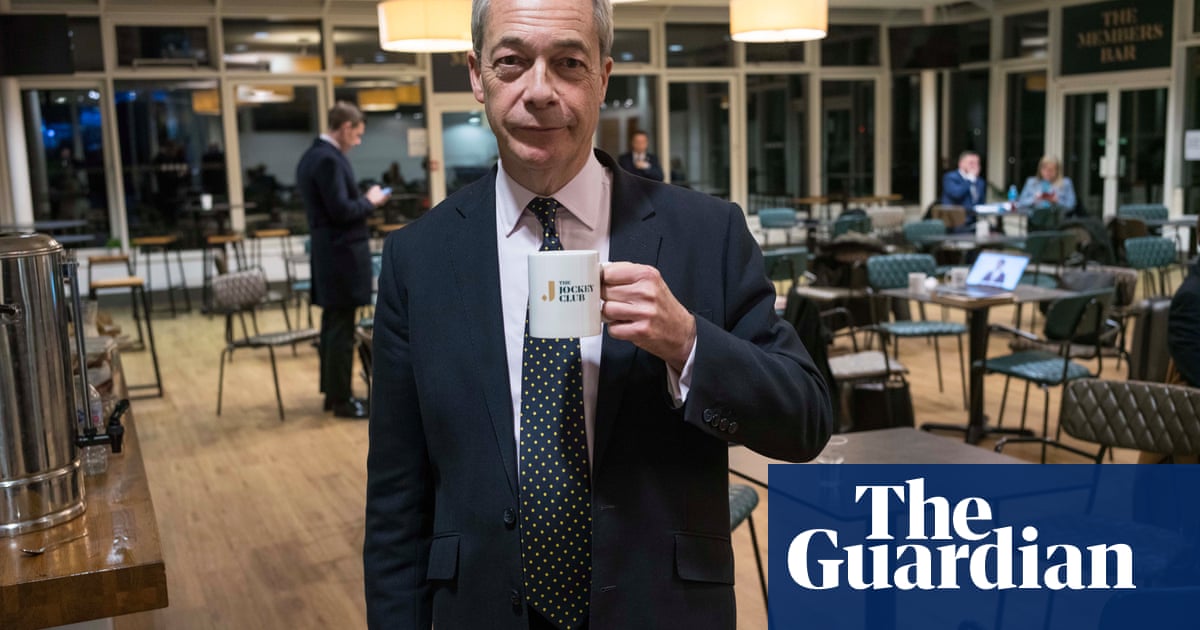UK growth slows over the summer
Newsflash: the UK economy has suffered a summer slowdown.
GDP rose by just 0.1% in the July-September quarter, data just released by the Office for National Statistics shows.
That’s down from the 0.5% growth in the second quarter of the year, and weaker than the 0.2% expected.
The scorecard for the Labour govenment’s first quarter in office shows that the services sector grew by 0.1%, while construction grew 0.8%.. but production fell by 0.2% in the quarter.
Key events Show key events only Please turn on JavaScript to use this feature
Resolution: UK falls off the top of the G7 growth leaderboard
The Resolution Foundation have calculated that the UK has fallen behind the US for growth so far this year.
They explain that the UK had the fastest growing economy in the G7 in the first half of this year, after growing by 1.2% from January to June.
But Britain’s GDP rebound has now “run out of steam”, with today’s data showing GDP slowing to 0.1% in the third quarter of 2024 (one of the weakest rates across the G7, as explained here).
Resolution say this slowdown puts UK growth over the first three quarters of the year at 1.3%, behind the US (1.9%) but ahead of France and Italy (0.8% and 0.4%), with Canada set to stay just behind the UK based on current forecasts.
Simon Pittaway, senior economist at the Resolution Foundation, says:
“After bouncing back from recession earlier this year, Britain’s recovery is already running out of steam. The UK has fallen below the US at the top of the G7 GDP growth leaderboard, with growth slowing, wage rises shrinking and employment starting to fall.
“The UK has been a GDP rollercoaster over the past 12 months, but its medium-term performance has been staid and stagnant. Over the past five years, the economy has shrunk by 0.7 per cent once you account for population growth.
“This all serves to highlight that the Government’s mission to renew strong economic growth is both extremely hard, and absolutely necessary.”
Economist experts are in broad agreement that budget uncertainty hurt growth over the summer.
Hailey Low, associate economist at the National Institute of Economic and Social Research (NIESR), says:
“Today’s Q3 GDP figures, though less robust than in the first half of the year, reflect the impact of pre-budget uncertainty.
More notably, it is disappointing that the Chancellor did not fully leverage her landmark budget last month to introduce measures addressing the UK’s low productivity growth, tackling growth inertia, and stimulating long-term economic growth.”
Lindsay James, investment strategist at Quilter Investors, blamed ‘gloomy messaging’ from the government in the run-up to the budget:
“With the budget now firmly in the rearview mirror and the Chancellor reinvigorating her message of growth with the Mansion House speech, today’s quarterly GDP figures highlight the malaise the UK still finds itself in. Despite good momentum early this year, growth has stumbled once again, growing just 0.1% over the last three months, with September actually seeing a contraction.
Much of this will have been as a result of the gloomy messaging that was persistent in the run up to the budget, causing consumers and businesses to pause spending and await what pain was to come.
Here’s Jeremy Batstone-Carr, European strategist at Raymond James Investment Services:
“This morning’s data confirms that the pace of UK economic expansion slowed in the run-up to Rachel Reeves’ inaugural Budget. As consumers and businesses waited to hear the Government’s fiscal policy plans, economic activity decelerated, although not to a halt. Despite weakness in government spending and trade, buoyancy in consumer spending was sufficient to grow the economy by 0.2% in the third quarter of this year.
Reeves: I am not satisfied with these numbers
Chancellor Rachel Reeves says she is “not satisfied” with today’s GDP figures showing the economy slowed over the summer.
Reeves says:
“Improving economic growth is at the heart of everything I am seeking to achieve, which is why I am not satisfied with these numbers.
“At my Budget, I took the difficult choices to fix the foundations and stabilise our public finances.
“Now we are going to deliver growth through investment and reform to create more jobs and more money in people’s pockets, get the NHS back on its feet, rebuild Britain and secure our borders in a decade of national renewal.”
UK towards bottom of G7 growth table for Q3
Today’s GDP report shows that the UK is sitting towards the bottom of the G7 for growth over the summer.
Here’s how the lacklustre growth of just 0.1% last quarter compares with other major economies:
-
US: +0.7% (or an ‘annualised rate’ of 2.8%) in Q3
-
France: +0.4%
-
Canada: Not published yet, but expected to be +0.25%
-
Germany: +0.2%
-
Japan: +0.2%
-
UK: +0.1%
-
Italy: 0%
Labour have pledged to deliver the “highest sustained growth in the G7”; today’s data shows plenty of progress is needed…..
Luke Bartholomew, deputy chief economist at investment group abrdn, also points the finger at the budget:
“The economy was always going to slow from the famously “gangbusters” pace of the first half of this year, but the extent of the slowdown is a bit more pronounced than expected.
With activity growth in September being reported as particularly weak, it is plausible that some of slowing is the result of elevated uncertainty at that time, as firms and households speculated about possible tax changes ahead of the Budget. That said, it is also possible that this just represents normal monthly volatility rather than anything more fundamental.
In any regard, the contents of the Budget ended up somewhat boosting the growth and inflation picture for 2025, and so in that context these data will probably do little to change the thinking at the Bank of England. We continue to expect further gradual easing, with the next rate cut coming early next year.”
CBI: Budget uncertainty probably played 'big part' in summer slowdown
The CBI are blaming the uncertainty around last month’s budget for the slowdown in growth over the summer.
Ben Jones, CBI Lead Economist says:
“The UK economy stalled over the third quarter. Uncertainty ahead of the Budget probably played a big part, with firms widely reporting a slow-down in decision making. Hopefully this will prove to be a blip. We still expect the economy to return to a path of modest growth in the year ahead. But downside risks to the outlook have increased.
“The Budget has set off warning lights for business. The hike in National Insurance Contributions alongside other increases to employers’ cost base will add to the burden on business. And it is expected to trigger a more cautious approach to pay, hiring and investment as companies work through what it means for their own budgets.
Here’s a chart showing how the UK economy fared over the last quarter – shrinking in the second half of last year, before returning to growth in 2024:

ONS: growth was subdued across most industries
ONS Director of Economic Statistics Liz McKeown says:
“The economy grew a little in the latest quarter overall as the recent slowdown in growth continued. Retail and new construction work both performed well, partially offset by falls in telecommunications and wholesale. Generally, growth was subdued across most industries in the latest quarter.
“In September the economy shrank a little. Services showed no growth with a notable increase in car sales offset by a slow month for IT companies. Production fell overall, driven by manufacturing, though there was an increase in oil and gas extraction.”
Economy shrank in September
The UK economy ended the summer on a weak note, with GDP contracting in September.
Today’s GDP report shows that monthly real GDP is estimated to have fallen by 0.1% in September.
This was largely due to declines in manufacturing output and information and communication services, the ONS says.
While the services sector stagnated in September, production output fell by 0.5% in the month, but construction output grew by 0.1%.
Real GDP per head fell in Q3
Disappointingly, the economy actually contracted in the last quarter once you adjust for population changes.
Real GDP per head is estimated to have fallen by 0.1% in the third quarter of 2024, and is flat, compared with the same quarter a year ago, the ONS says.
That’s one indicator for a country’s living standard.
UK growth slows over the summer
Newsflash: the UK economy has suffered a summer slowdown.
GDP rose by just 0.1% in the July-September quarter, data just released by the Office for National Statistics shows.
That’s down from the 0.5% growth in the second quarter of the year, and weaker than the 0.2% expected.
The scorecard for the Labour govenment’s first quarter in office shows that the services sector grew by 0.1%, while construction grew 0.8%.. but production fell by 0.2% in the quarter.
We’ve also learned overnight that Japan’s economy slowed over the summer.
Japan’s GDP rose by just over 0.2% in July-September, according to new government data that shows the economy grew at an annualised rate of 0.9% in Q3.
That’s a slowdown on Q2, when Japan’s economy grew by around 0.55%.
Although household spending held up in the last quarter, there was a dip in capital spending as firms held back from investment decisions. Net trade also had a negative impact on growth.
Bank of England governor says Brexit has undermined UK economy

Heather Stewart
Brexit has also been holding back the UK economy, the Bank of England governor warned last night as he urged ministers to “rebuild relations” with the EU.
Speaking at the Mansion House dinner in the City of London on Thursday evening, Andrew Bailey said he took no position on Brexit “per se”, but added: “I do have to point out consequences.”
He said Brexit had “weighed” on the economy, pointing out in particular the impact of Brexit on the UK’s trade in goods, adding:
“It underlines why we must be alert to and welcome opportunities to rebuild relations while respecting the decision of the British people.”
Keir Starmer’s government has pledged to deepen cooperation with the EU, though Brussels has made clear it is unwilling to hold wide-ranging negotiations on the trade and cooperation agreement (TCA).
Labour is opposed to re-entering the EU’s single market or customs union. Instead, the government hopes to win more modest changes such as mutual recognition of professional qualifications and a veterinary agreement that could alleviate the need for checks on food exports.
Introduction: UK GDP report coming up
Good morning, and welcome to our rolling coverage of business, the financial markes and the world economy.
Keir Starmer and Rachel Reeves are about to get their first quarterly growth report since taking office, and it’s not expected to be sparkling.
At 7am GMT the first estimate of UK GDP for the third quarter of 2024 will be released, as well as for September alone.
Economists are expecting the economy grew by 0.2% in July-September, a relatively weak growth rate. That would be a slowdown on the 0.5% growth recorded in April-June, and the 0.7% in January-March.
If that happens, Labour’s gloomy talk since winning the general election in early July is likely to take some other blame. Warnings of a ‘painful’ budget hit confidence among both consumers and businesses, which will have a knock-on impact on spending, and investment decisions.
On the other hand, Reeves could well argue that a slow-moving economy justifies her push for growth – although the extra spending laid out in last month’s budget is only expected to give a short-term lift to economic output…
Previous data have shown that the UK economy stagnated in June and July – as the recovery from last year’s shallow recession faded – before returning to growth in August.
Sanjay Raja, chief UK economist at Deutsche Bank, predicts that the UK economy moved from a “spring sizzle” to a “summer simmer”.
After a solid H1-24, UK growth over summer will likely slow. We expect Q3-24 GDP growth to slow to a more paltry 0.2% quarter-on-quarter.
We see September GDP, which will also be released as part of the GDP data dump, rising by 0.2% month-on-month. Risks are skewed higher on the quarterly print, but lower on the monthly September print, we think.
The agenda
-
7am GMT: First estimate of UK GDP for Q3 2024
-
7am GMT: First estimate of UK GDP for September 2024
-
7am GMT: UK trade balance for Q3 2024
-
8.30am GMT: Hong Kong’s GDP report for Q3 2024
-
9.30am GMT: UK productivity data for Q3 2024
-
1.30pm GMT: US retail sales for October

.png) 1 month ago
11
1 month ago
11













































